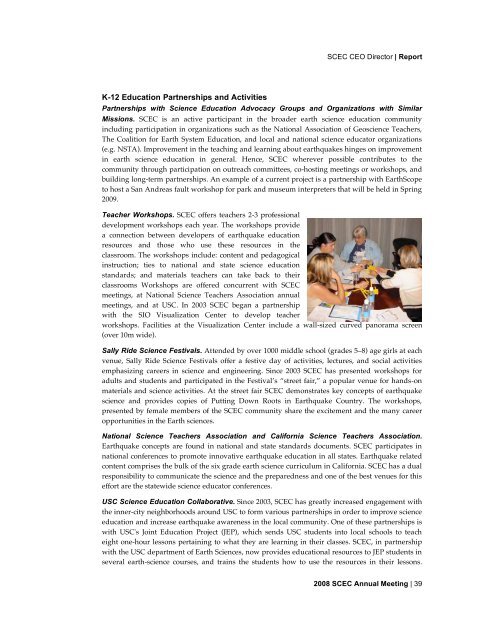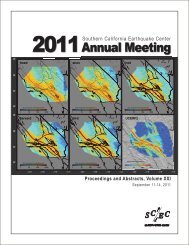Annual Meeting - SCEC.org
Annual Meeting - SCEC.org
Annual Meeting - SCEC.org
- TAGS
- annual
- meeting
- www.scec.org
Create successful ePaper yourself
Turn your PDF publications into a flip-book with our unique Google optimized e-Paper software.
K-12 Education Partnerships and Activities<br />
<strong>SCEC</strong> CEO Director | Report<br />
Partnerships with Science Education Advocacy Groups and Organizations with Similar<br />
Missions. <strong>SCEC</strong> is an active participant in the broader earth science education community<br />
including participation in <strong>org</strong>anizations such as the National Association of Geoscience Teachers,<br />
The Coalition for Earth System Education, and local and national science educator <strong>org</strong>anizations<br />
(e.g. NSTA). Improvement in the teaching and learning about earthquakes hinges on improvement<br />
in earth science education in general. Hence, <strong>SCEC</strong> wherever possible contributes to the<br />
community through participation on outreach committees, co-hosting meetings or workshops, and<br />
building long-term partnerships. An example of a current project is a partnership with EarthScope<br />
to host a San Andreas fault workshop for park and museum interpreters that will be held in Spring<br />
2009.<br />
Teacher Workshops. <strong>SCEC</strong> offers teachers 2-3 professional<br />
development workshops each year. The workshops provide<br />
a connection between developers of earthquake education<br />
resources and those who use these resources in the<br />
classroom. The workshops include: content and pedagogical<br />
instruction; ties to national and state science education<br />
standards; and materials teachers can take back to their<br />
classrooms Workshops are offered concurrent with <strong>SCEC</strong><br />
meetings, at National Science Teachers Association annual<br />
meetings, and at USC. In 2003 <strong>SCEC</strong> began a partnership<br />
with the SIO Visualization Center to develop teacher<br />
workshops. Facilities at the Visualization Center include a wall-sized curved panorama screen<br />
(over 10m wide).<br />
Sally Ride Science Festivals. Attended by over 1000 middle school (grades 5–8) age girls at each<br />
venue, Sally Ride Science Festivals offer a festive day of activities, lectures, and social activities<br />
emphasizing careers in science and engineering. Since 2003 <strong>SCEC</strong> has presented workshops for<br />
adults and students and participated in the Festival’s “street fair,” a popular venue for hands-on<br />
materials and science activities. At the street fair <strong>SCEC</strong> demonstrates key concepts of earthquake<br />
science and provides copies of Putting Down Roots in Earthquake Country. The workshops,<br />
presented by female members of the <strong>SCEC</strong> community share the excitement and the many career<br />
opportunities in the Earth sciences.<br />
National Science Teachers Association and California Science Teachers Association.<br />
Earthquake concepts are found in national and state standards documents. <strong>SCEC</strong> participates in<br />
national conferences to promote innovative earthquake education in all states. Earthquake related<br />
content comprises the bulk of the six grade earth science curriculum in California. <strong>SCEC</strong> has a dual<br />
responsibility to communicate the science and the preparedness and one of the best venues for this<br />
effort are the statewide science educator conferences.<br />
USC Science Education Collaborative. Since 2003, <strong>SCEC</strong> has greatly increased engagement with<br />
the inner-city neighborhoods around USC to form various partnerships in order to improve science<br />
education and increase earthquake awareness in the local community. One of these partnerships is<br />
with USC's Joint Education Project (JEP), which sends USC students into local schools to teach<br />
eight one-hour lessons pertaining to what they are learning in their classes. <strong>SCEC</strong>, in partnership<br />
with the USC department of Earth Sciences, now provides educational resources to JEP students in<br />
several earth-science courses, and trains the students how to use the resources in their lessons.<br />
2008 <strong>SCEC</strong> <strong>Annual</strong> <strong>Meeting</strong> | 39



